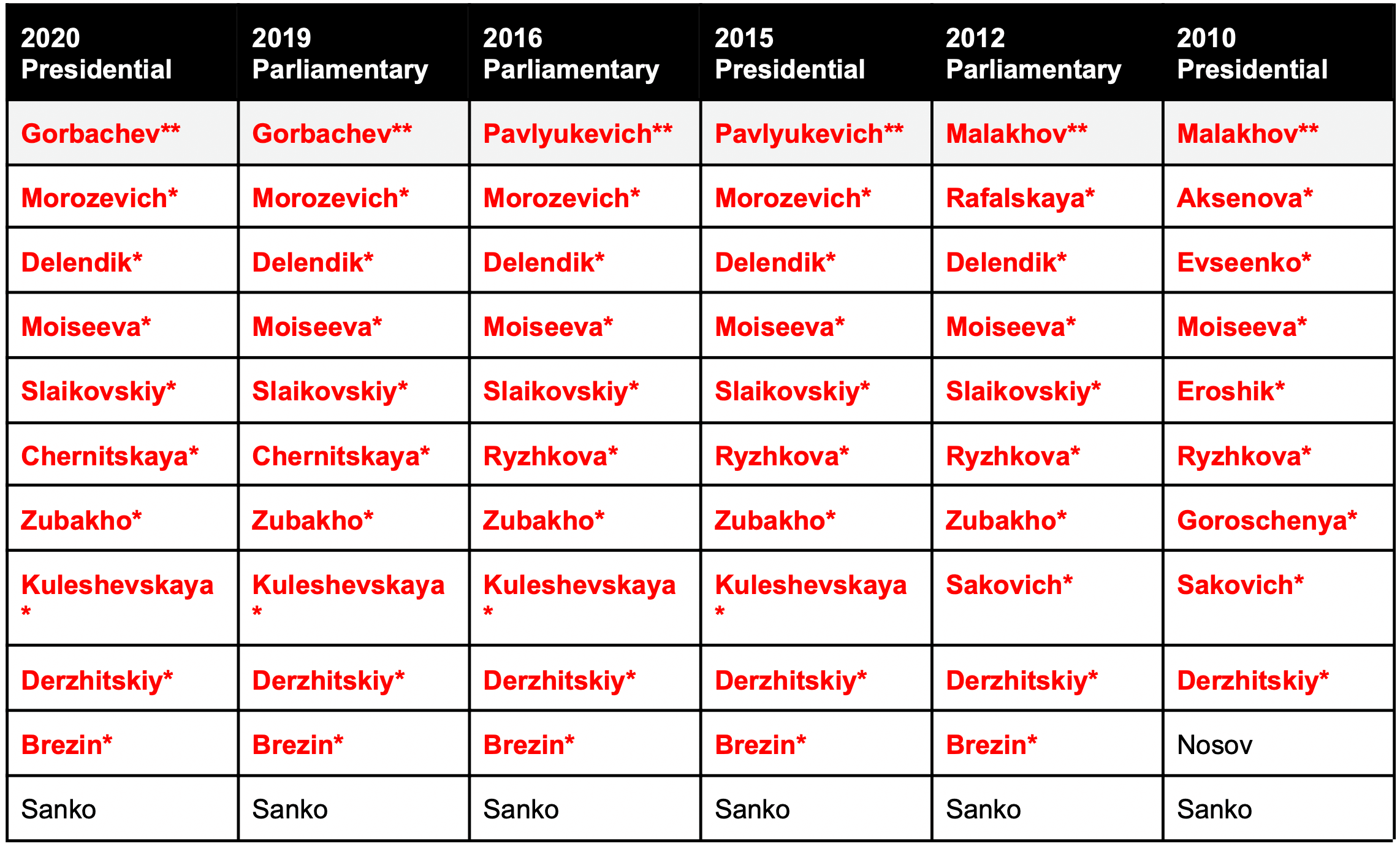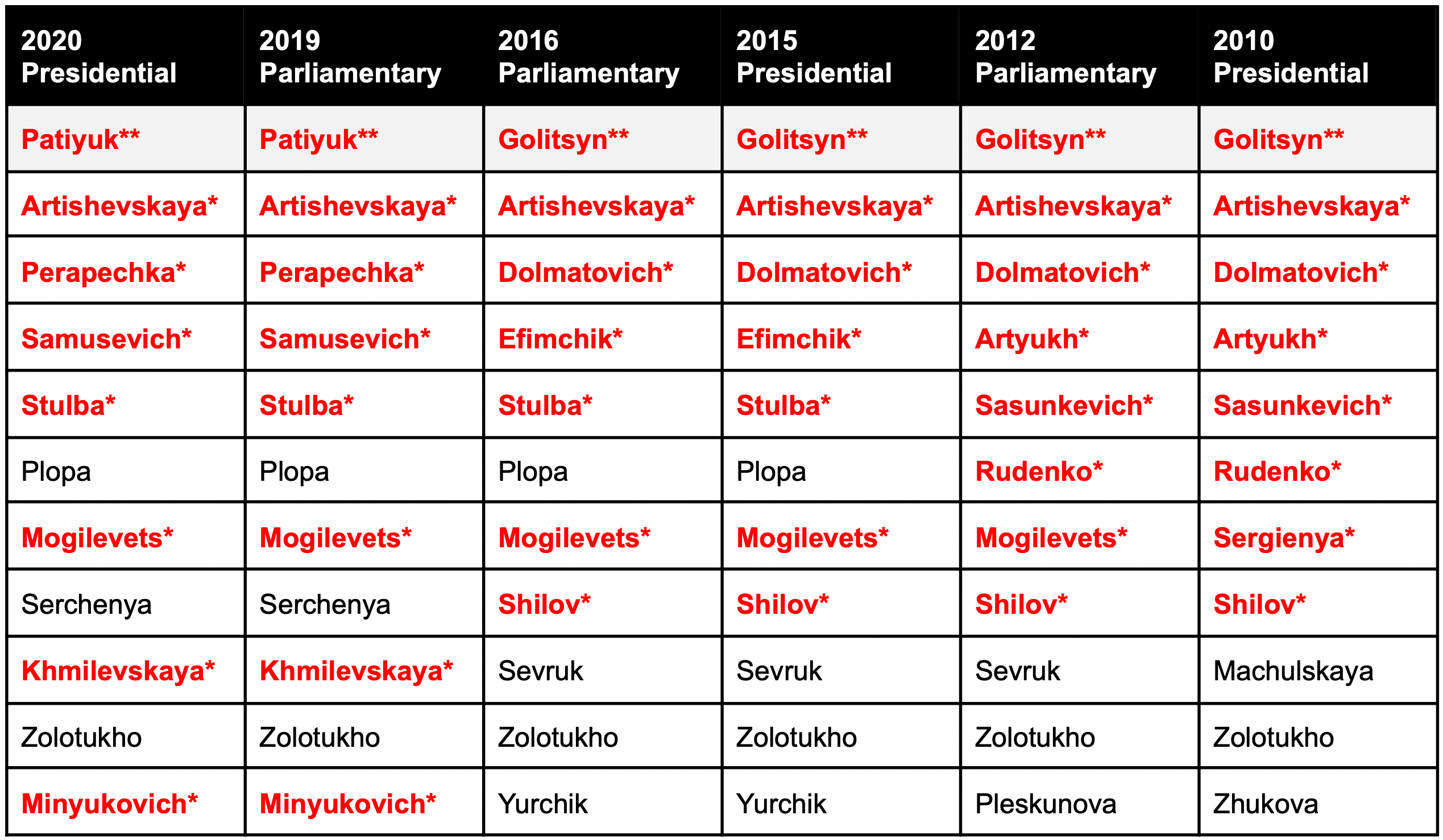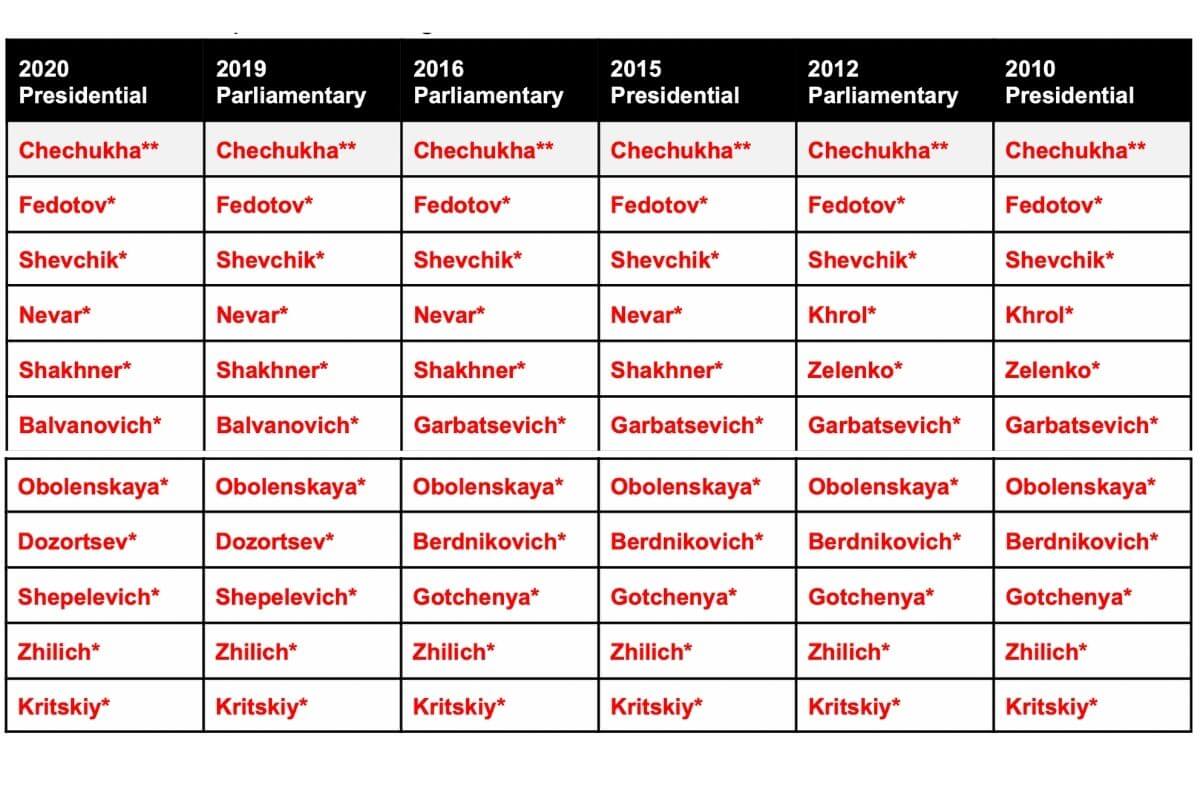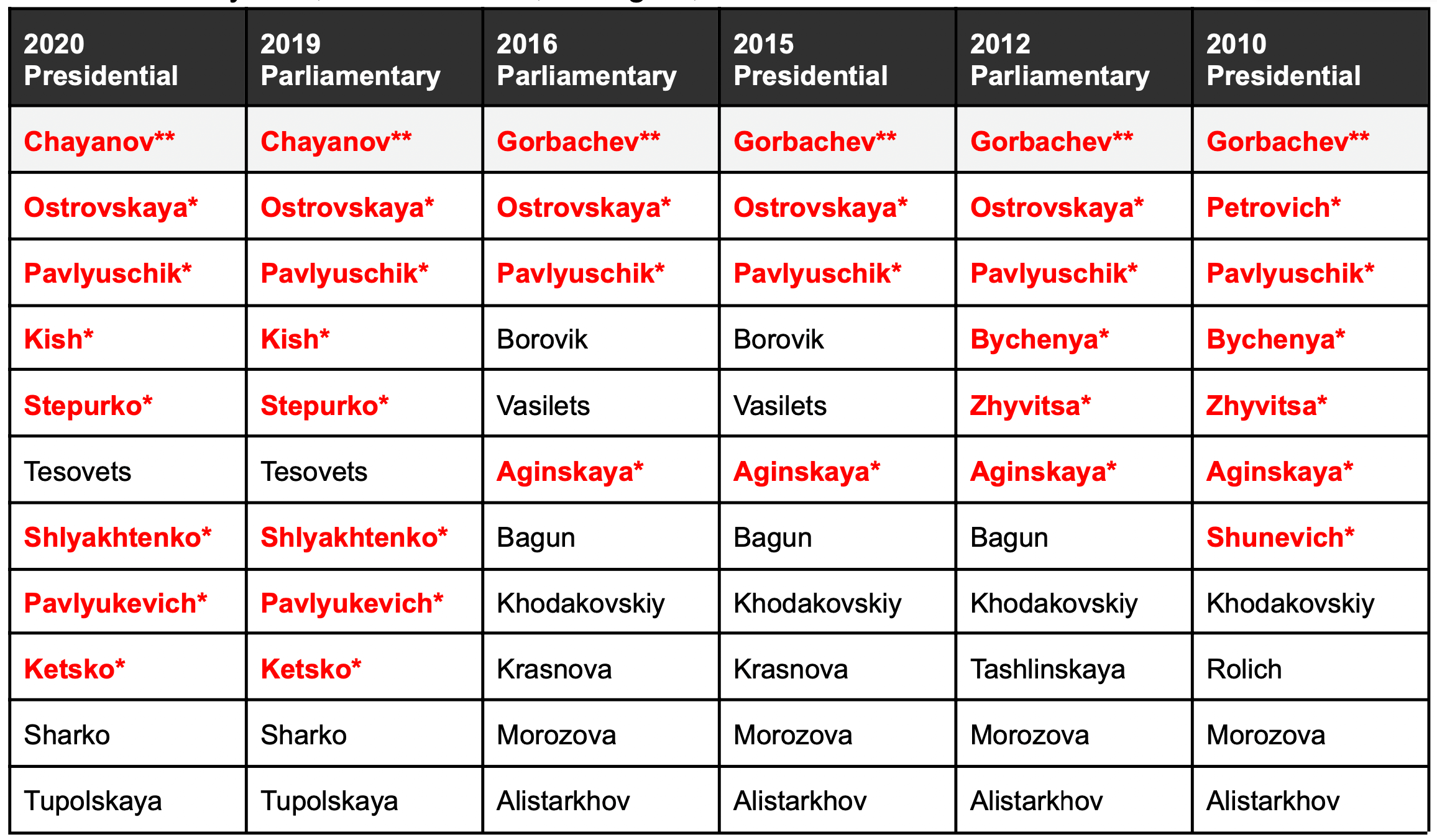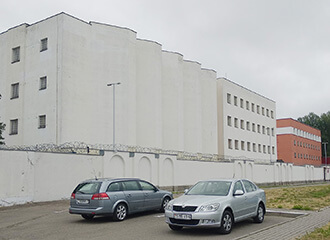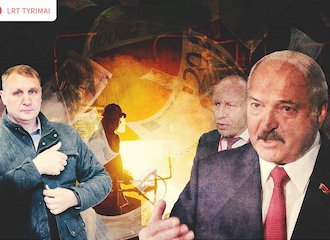На русском языке:
«Кровавый беларусский калий»: Как Беларуськалий сфальсифицировал выборы в пользу Лукашенко
На беларускай мове:
«Крывавы беларускі калій»: Як Беларуськалій сфальсіфікаваў выбары на карысць Лукашэнкі
The Belarusian diaspora in the United States has published an investigation about Belaruskali being involved in the falsification of elections in Belarus, which confirms that the potash giant has been rigging elections in favor of Lukashenka for at least ten years. We publish the investigation unchanged.
On August 27, 2021, at the official opening of a new potash mine, Alexander Lukashenka, who has been holding Belarus in an iron grip for over 27 years, called Belarusian potash «red gold». Indeed, the hard-currency revenues of Belaruskali, one of the world’s biggest potash producers, has been the lifeblood for Lukashenka’s dictatorship, providing it with resources to sustain its oppressive policies.
However, Belaruskali is not just the main breadwinner for the rogue regime. The company has been directly involved in electoral fraud and human rights abuses, specifically, violating Article 25 of the International Covenant on Civil and Political Rights (ICCPR) as well as the right to fair election guaranteed by the Belarusian Constitution. As evidence presented in this report shows, Belaruskali’s top executives for years have been actively engaged in rigging elections in favor of Lukashenka in the city of Salihorsk, where the company is located. Like dozens of other state-owned enterprises, government agencies, schools and universities, state-controlled civic organizations, Belaruskali was a part of a well orchestrated electoral charade, which started to crumble in August, 2020 under the pressure of unprecedented demand for change from the ordinary Belarusians.
The fact that Belaruskali retaliated against its employees for their political views in the wake of the August, 2020 presidential election has been well covered by the media . The company fired over a hundred of the most active workers who organized a strike, standing up for their rights, including the right «to vote and to be elected at genuine periodic elections», guaranteed to them by the International Bill of Human Rights as well as by the Belarusian Constitution . What has not been widely publicized is that their own employer, Belaruskali, has been instrumental to violating these rights, which eventually triggered the protests and strikes. Moreover, the potash giant appears to have been rigging elections in favor of Lukashenka for at least a decade.
Before delving into the mechanics of the electoral fraud that Belaruskali’s executives helped engineer, we should explain the level of influence the company wields over the city of Salihorsk. The population of Salihorsk is slightly over 100 thousand people while Belaruskali has about 20 thousand employees. Given that the number of voters in Salihorsk is about 60 thousand, roughly one third of them must work in Belaruskali. If you include also their family members, it appears that the majority of voters in Salihorsk have their livelihood in some way dependent on Belaruskali.
Elections in Belarus – none of which have been deemed to be up to OSCE standards during Lukashenko’s rule – are organized by the Central Election Commission (CEC). The CEC, which was sanctioned by the U.S. Treasury for electoral violations in late 2020 , oversees the whole process and supervises the work of Precinct Election Commissions (PECs, a.k.a UIKs, which is the same acronym but in Russian), which in turn operate voting stations and count the ballots in the end. There is another level of local electoral bureaucracy in between the CEC and the PECs – Territorial Election Commissions (TECs). The TECs are tasked with overseeing the process in a specific locality, usually consisting of several PECs. Thus, for example, all Salihorsk PECs report to the same Salihorsk TEC.
The work of PECs is crucial for the whole process as they are the ones that control the actual voting and ballot counting procedures. Not surprisingly, the biggest chunk of the most egregious electoral fraud in Belarus, such as ballot stuffing or turnout manipulations, happens at the PECs level.
Given how instrumental the PECs are to conducting an election, the formation of PECs is where a Belarusian electoral charade begins. By law, PEC members can be nominated by political parties, civic organizations, and citizens. Then, out of these nominees, the final roster of the PEC members is selected and approved by the local executive authorities. As the Belarusian Helsinki Committee described it in its final report for the 2015 presidential election, this procedure is just a formality usually taking no more than 30 minutes. Local executive authorities in Belarus are appointed by the President, and in practice that means that the PECs end up being packed with Lukashenka’s loyalists, which has been noted in several OSCE ODIHR reports.
Moreover, usually the same people are selected into a specific PEC from one campaign to the next. Thus, the PECs are often tight-knit groups of those who support (or have to support) Lukashenka and who had already worked together in previous elections. And the most salient fact – purposefully concealed from the public eye – is that the members of a particular PEC are also connected through employment, working together, with their own boss serving as the chair of the same PEC. Thus, the PEC selection process from the outset is designed to facilitate collusion and fraud, and is brought to life by state-owned enterprises, like Belaruskali, that conspire to get PECs assembled in this undemocratic way.
In Salihorsk, there are 5 PECs almost exclusively made up of Belaruskali’s employees. One would think that this could be a coincidence given how many people in Salihorsk are employed by Belaruskali. However, each of these PECs is controlled by a specific corporate department within Belaruskali and, furthermore, is chaired by the leader of the same department. In addition, this composition of PECs has been consistent over at least a decade, throughout six presidential and parliamentary electoral campaigns. That can’t be explained by anything else, other than a coordinated and systematic effort of Belaruskali and its executives to engage in electoral fraud.
To demonstrate how this illegal scheme works, we will take as an example PEC #13, located in Secondary School #4 of Salihorsk at 12 Lenin Street. In August 2020, the chair of the PEC was Aleksandr Gorbachev. He also happened to be the Head of Belaruskali’s Production Unit 3 (PU-3). In this capacity at Belaruskali, Mr. Gorbachev supervises about 2,600 employees, nine of whom ended up in the same PEC with him. The deputy chair of the PEC was Svetlana Morozevich, who at the same time served as PU-3’s Deputy Head for Ideology, reporting directly to Mr. Gorbachev. Similarly, the other eight members held various positions in PU-3, eventually reportng to Mr. Gorbachev.
Thus, out of 11 PEC members, 10 worked in PU-3 and one of them was the top executive leading PU-3 at Belaruskali. A PEC chair is elected by the PEC members. The fact that the head of the corporate department was picked to be the PEC chair – identical to the situation in the other four Belaruskali PECs – already demonstrates a glaring conflict of interest, highlighting that the relationships between the PEC members were not relationships between independent citizens, but rather relationships between a boss and his subordinates. It’s important to note as well that PEC’s decisions are made by a simple-majority vote and two thirds of the members are required for a quorum. Given the authority Mr. Gorbachev could exercise over the majority of PEC #13, we can conclude that he gained full decision-making power in this PEC thanks to his position in Belaruskali.
To further demonstrate that this peculiar PEC selection was not a coincidence, let’s look at the members of the same PEC located in Secondary School #4 over the past six elections:
Members of the Secondary School #4 PEC (Family names of the members per campaign), led by Aleksandr Gorbachev, Head of PU-3, in August, 2020
* — Identified employees of Belaruskali’s PU-3
** — PEC Chair and Head of Belaruskali’s PU-3
As you can see, the composition of the PEC barely changes throughout the last decade. The PEC has consisted almost exclusively of PU-3 employees and has always been led by the Head of PU-3. Even when PU-3 gets a new Head, this person immediately assumes the role of the chair of the corresponding PEC. Also it is evident that the same group of people has been selected to be members of the same PEC over and over again. No reasonable person would believe that anything like that could have happened by chance, especially given that the same pattern has consistently occurred in the other four Belaruskali’s PECs in Salihorsk.
In addition to the evidence of collusion during its formation, PEC #13 at Secondary School #4 has been caught actually rigging votes in Lukashenka’s favor. PEC #13 was one of the few commissions that released the final vote counting protocol .The PEC#13’s protocol stated that Alexander Lukashenka won 1,905 out of 2,452 votes at the polling station and Sviatlana Tsikhanouskaya garnered only 191 votes. These numbers contradicted the results of an independent vote checking organized by the online platform Golos («Voice» in English), which provided verified photos of at least 213 ballots for Ms. Tsikhanouskaya submitted by voters, demonstrating that the official results were rigged . According to Pavel Liber, one of the founders of Golos, an independent statistical analysis based on Golos’ data predicted that Ms. Tsikhanouskaya had won north of 50% of the votes consistently across Belarus.
The mismatch of the final ballot count wasn’t the only violation of the electoral law at PEC #13. Independent observers weren’t allowed to be present in the building of the school where the PEC was located. As everywhere in Salihorsk, the whole electoral process, including the final ballot counting, went on behind the closed doors. Independent observers were harassed and arrested. Tsimafei Malahouski, who was one of the independent observers in Salihorsk with the civic initiative Honest People, had to literally run away from the police after he tried to inquire about the official results at one of the voting stations. He was denied seeing a copy of the official protocol the next day either. As it’d become known later, only about 22% of the PECs released their official results in Belarus. A few months later, Tsimafei and the entire team of Honest People had to flee Belarus in fear of prosecution as the regime started a wave of repression, retaliating against journalists and civic activists.
Mr. Gorbachev, the head of PEC #13, is a seasoned violator of the Belarusian electoral system. He participated in at least 6 electoral campaigns, none of which met the OSCE standards. In 2015, Mr. Gorbachev was caught on video coercing Belaruskali’s workers to vote early (early voting is typically when lots of fraudulent manipulations in favor of Lukashenka happens, since such voting is not accompanied by even the most rudimentary safeguards against fraud).
The situation with the other four Belaruskali’s PECs is similar to the one led by Mr. Gorbachev. All of them have been headed by Belaruskali’s top executives – Sergei Patiyuk, Oleg Chechukha, Aleksandr Chayanov and Viktor Getmanov – with their reports serving as the PEC members. The composition of these PECs hasn’t changed much over the past decade (see Appendix, Tables 2 through 5). Over that time, the churn in the Belaruskali PECs was on average only 20% (thus, on average, 80% of the PEC members would participate in the following campaign in the same PEC). At each of the other four PECs there were serious violations of the electoral law.
Besides the PECs, Belaruskali selects its representative to the Salihork TEC, a body that is supposed to oversee the local PECs, including the five we mentioned above, review complaints and resolve disputes during the electoral process. As with PECs, it is a person in a specific position within Belaruskali’s organizational chart who always gets nominated and selected to have a seat in the TEC – namely, the Head of Human Resources and Deputy Chief for Ideology (Mikhail Sevruk in August 2020) – who reports directly to the CEO, Ivan Golovaty. Thus, the top HR boss of the main employer of the city oversees elections, having full authority – direct or indirect – over anyone who would dare to question the process and challenge the results.
Moreover, the CEO of Belaruskali, Ivan Golovaty, served as one of the only 30 official representatives of Alyaksandr Lukashenka in the August 2020 election (Mr. Golovaty held the same role in the 2015 presidential campaign as well). He is also one of the leaders of a local branch of the largest pro Lukashenka public association «Belaya Rus», as well as a member of the Council of the Republic, the upper chamber of the Belarusian Parliament (which, in turn, is also elected in the same fraudulent way). Mr. Golovaty, who reportedly has very close ties to the Lukashenka family, was appointed by Alexander Lukashenka to the position of Belaruskali’s CEO and obviously has clear personal interest in his reelection. It’s hard to believe Mr. Golovaty would not be aware of Belaruskali’s involvement in rigging elections.
According to the final report by Golos , the official results of the August 9th, 2020 presidential election can’t be trusted given the number of inconsistencies, violations and the hard evidence of electoral fraud. This conclusion is corroborated by the OSCE’s Moscow Mechanism Report on Belarus, which states that «allegations that the presidential elections were not transparent, free or fair were found confirmed«.
The systematic electoral fraud, including the corrupt composition of PECs, is one of the hallmarks of the repressive system sustaining Lukashenka’s dictatorship. It is organized and facilitated by major state-owned enterprises, state-controlled organizations and government agencies, under the protection of local security forces. In the case of Belaruskali, we can see how the fraudulent scheme is perpetuated by the top executives of the company and how human rights violations have essentially become part of their professional duties and job description.
Members of the Secondary School #8 PEC at 16 Parkovaya Street, led by Sergei Patiyuk, Head of PU-4 / August, 2020
* — Identified employees of Belaruskali’s PU-4
** — PEC Chair and Head of Belaruskali’s PU-4
Members of the Belaruskali’s Automatization Department PEC at 69a Oktyabrskaya Street, led by Oleg Chechukha, Head of Department / August, 2020
* — Identified employees of Belaruskali’s Automatization Department
** — PEC Chair and Head of Belaruskali’s Automatization Department
Members of the Belaruskali’s Dorm #3 PEC at 3 Parkovyi Proezd, led by Alexander Chayanov, Head of PU-1 / August, 2020
In 2015 and 2016 the PEC was located in Salihorsk College
* — Identified employees of Belaruskali’s PU-1
** — PEC Chair and Head of Belaruskali’s PU-1
Members of Secondary School #14 PEC at 6 Sudilovskogo Street, led by Viktor Getmanov, Head of PU-2 / August, 2020
Prior to 2019 the PEC was located in Secondary School #5
* — Identified employees of Belaruskali’s PU-2
** — PEC Chair and Head of Belaruskali’s PU-2
*** — Deputy Head of Belaruskali’s PU-2
